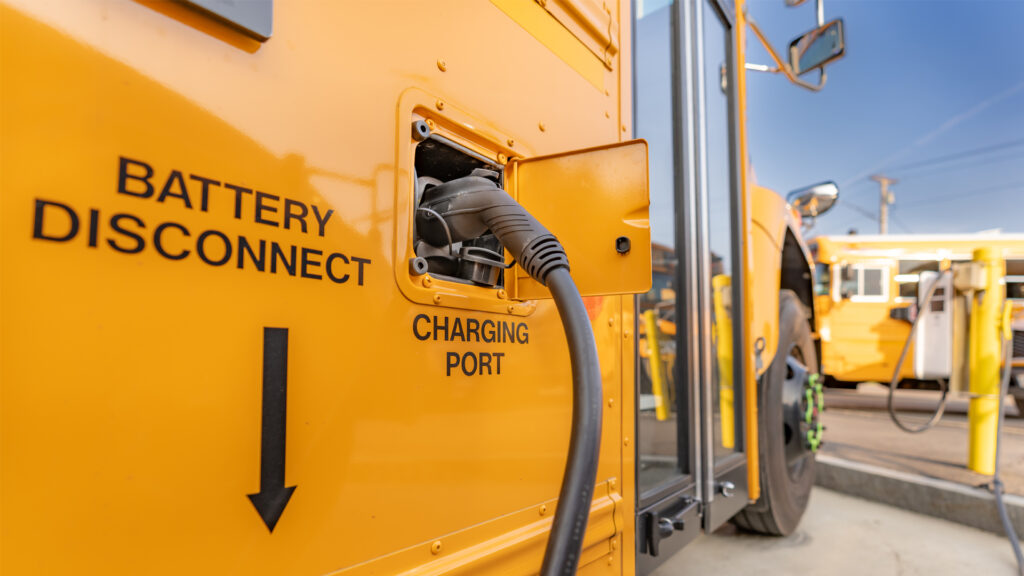By Lorna Perez, Moms Clean Air Force
Every day, over 850,000 Florida children board diesel-powered school buses, breathing in toxic fumes on their way to school. For many of these children, this is not just an inconvenience; it’s a serious health risk.
Diesel exhaust is a toxic mixture of carcinogens and particulates that can settle into the lungs of developing children, contributing to asthma, respiratory problems and cognitive issues. This is not a problem we can afford to ignore.
We cannot wait any longer to address this issue. It’s time for action – time for Florida to lead the way in transitioning to electric school buses.

These buses have zero tailpipe emissions, meaning they do not release harmful pollutants into the air our children breathe. They are not just cleaner for the environment but also cost effective, saving taxpayers 60% on operating and maintenance costs compared to diesel buses. The shift to electric buses will improve public health and reduce environmental damage, benefiting all communities – especially those most impacted by pollution.
In Florida, where asthma rates are already high, diesel exhaust makes the situation even worse. Communities already impacted by air pollution – especially low income and communities of color – bear the heaviest burden. According to the American Lung Association report nearly 270,000 children in Florida have asthma – that’s almost 270,000 children who could be at heightened risk for an asthma attack just by stepping onto a diesel bus.
As an aunt, I can’t help but imagine how different the daily commute would be for my 6-year-old nephew if his ride to school were cleaner, safer and healthier. Right now, too many kids are suffering from asthma attacks and missed school days because of the toxic air around them. We cannot allow this to continue.
The solution is clear: electric school buses. Transitioning to electric vehicles by 2035 could save Florida $69.9 billion in public health benefits by 2050. As production of electric buses increases, the cost will decrease, making this transition even more affordable in the future.
But this transition won’t happen without our collective effort. Federal investments such as those through the Environmental Protection Agency’s Clean School Bus Program are essential to helping school districts replace diesel school buses with electric ones.
Unfortunately, these programs are now at risk. Some policymakers are pushing to slash funding for clean energy programs, jeopardizing the health of our children and delaying progress. If these funds are cut, many school districts will struggle to afford the upfront costs of electric buses, leaving our children exposed to dangerous – and avoidable – diesel fumes.

As we honor Earth Month, we are reminded of our collective responsibility to protect the planet and future generations. This month serves as a call to action for all of us to take steps toward a more sustainable future. The transition to electric school buses is part of that future – one where every child can breathe clean air, and all communities can thrive in a healthier, more sustainable world.
The transition to electric school buses is not just an investment in cleaner air – it’s an investment in our children’s health, education and future. Let’s ensure that every child has a clean, healthy ride to school and that we create a future where all communities can breathe easier.
You can take part in making this a reality by contacting your local lawmakers and urging them to support, protect and expand federal funding for electric school buses. Let them know you care about the health of Florida’s children and the future of our state. Together, we can roll toward cleaner, healthier air for all.
Lorna Perez is Florida field consultant for Moms Clean Air Force. Banner image: Electric school buses (Pierre5018, CC BY 4.0, via Wikimedia Commons).
Sign up for The Invading Sea newsletter by visiting here. To support The Invading Sea, click here to make a donation. If you are interested in submitting an opinion piece to The Invading Sea, email Editor Nathan Crabbe at ncrabbe@fau.edu.




It is imperative that we transition to renewable energy. This would be Solar, Wind, and renewable hydrogen. Stop all fossil fuels by 2035. No new nuclear. If we do not reduce our population nature will.